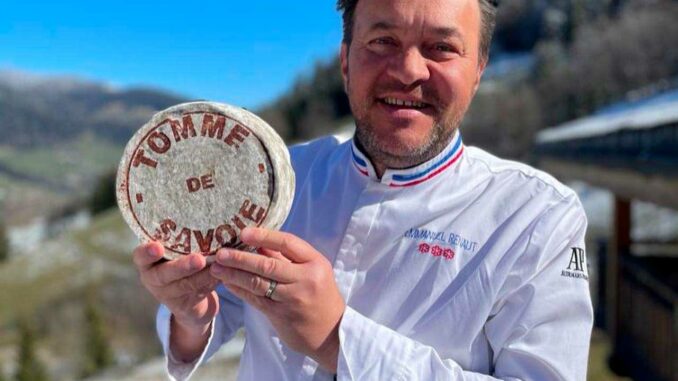
Discover Emmanuel Renaut’s Flocons de Sel in Megève—three Michelin stars, mountain-driven gastronomy, seasonal wild herbs, alpine terroir, and immersive dining.
High in the French Alps, Flocons de Sel is the living embodiment of mountain French gastronomy, translated through the hands of Emmanuel Renaut, one of France’s most respected chefs. Offering an elevated modern cuisine rooted in the identity of Haute-Savoie, the restaurant channels wild herbs, alpine fish, and forest mushrooms into compositions both striking and harmonious. With three Michelin stars, the establishment draws diners seeking more than a meal—it offers an immersive alpine gastronomic journey. For those exploring fine dining in the Alps, Flocons de Sel stands as a beacon of terroir, seasonality, and a chef’s dialogue with nature.
The chef: vision and background
Origins and education
Emmanuel Renaut was born on January 26, 1968, in Soisy-sous-Montmorency, in the Parisian suburbs, but his heart always traced toward the mountains. Raised in Aisne, he spent childhood holidays in the Haute-Savoie region, where his love for alpine nature first took root. He began formal culinary training at the CFA of Laon, followed by internships and early roles in Paris. His trajectory took him through prestigious kitchens: Hôtel Le Lotti, work under Christian Constant at Hôtel de Crillon, then a pivotal stint as sous-chef for Marc Veyrat at the Auberge de l’Eridan. He also gained experience in pastry under Yves Thuriès and spent time in London as head chef at Claridge’s. These formative chapters sharpened both his technique and his sensibility.
In 1998, Renaut relocated to Megève and founded Flocons de Sel. Over time, he expanded adjoining hotel and gastronomic offerings. His journey from apprentice to celebrated chef is inseparable from his embrace of mountain life and local terroir.
Culinary philosophy and style
Renaut’s style is rooted in alpine terroir, a cuisine that aims to place the mountain on the plate. He emphasizes seasonal produce, wild herbs, local fish, mushrooms, and high-alpine dairy, bringing forward ingredients often forgotten or overlooked. Rather than layering heavy sauces, he strives for balance and subtlety, letting each element shine. He describes his cooking as instinctive, driven by the land’s rhythms: what grows in the forest, what the garden yields today, what the lake offers.
In interviews, he talks of short, closed supply chains; walking into the forest to pick mushrooms; gathering herbs two hours before service; and using his own chickens, beehives, and artisanal bread. The vegetal component grows ever more central in his menus—even in this mountain setting. His cuisine often draws comparisons to chefs like Alain Passard, in the way vegetables, herbs, and terroir become protagonists.
Awards and recognition
Flocons de Sel is a three-Michelin-star temple of haute cuisine (as of 2012, the restaurant earned its third star, retaining it to present). The chef also carries the prestigious title of Meilleur Ouvrier de France (2004). He has been named “Chef of the Year” by peers and culinary publications. The restaurant holds five toques in Gault & Millau and is a member of the exclusive Les Grandes Tables du Monde and the Relais & Châteaux collection.
Renaut has also authored La Montagne et le cuisinier, and participates in media and culinary showcases that highlight mountain gastronomy and sustainable practice.
Broader influence
Beyond directing Flocons de Sel, Renaut is an ambassador for sustainable cuisine in alpine landscapes. His choices in sourcing, waste reduction, and biodiversity support local producers and forest ecosystems. He mentors younger chefs, especially those drawn to mountain cuisine, and engages in cultural and environmental projects. The chef is known for preserving regional gastronomic heritage, spotlighting lake fish, alpine herbs, and mountain cheeses in modern formats. His public voice often underscores the need to let local identity guide innovation in French cuisine today.
The restaurant: concept and experience
Location and atmosphere
Perched on the slopes above Megève, Flocons de Sel lies in a wooded, elevated setting, just minutes from the village. The hotel-restaurant complex comprises ten rooms, spa facilities, and a chalet-like structure blending wood, glass, stone, and clean modern lines. Interiors are luminous, with pastel woods, high ceilings, large windows framing alpine vistas, and décor that feels elegant but warm. Flocons de Sel evokes a mountain chalet reimagined: contemporary yet rooted, intimate yet expansive.
As the property is undergoing renovations through 2025, the main gastronomic restaurant is temporarily relocated to La Table Gastronomique in Flocons Village, in the heart of Megève, ensuring continuity of its culinary offering during transformation. This satellite location maintains the same gastronomic vision, in a more compact, seasonal space.
Cuisine and signature dishes
The menu at Flocons de Sel weaves a dialogue between seasonal mountain fare and refined technique. Signature motifs include lake fish (e.g. trout, pike, char) prepared with subtle aromatics and alpine herbs, wild mushrooms sculpted into textures, and carefully crafted vegetable plates revealing hidden flavors. Sample creations: langoustines marinated with citron, grapefruit and gentian root; a millefeuille of vegetables from pastures and gardens; herb salads built from 30–40 varieties; dishes using porcini, hogweed jus, or alpine flowers.
Diners move through a tasting narrative often called “La Randonnée” (the journey) or “a walk to Leutaz,” a multi-course expedition into the local terroir. Mountain cheeses from high pastures, delicate desserts inspired by forest fruits, and herb-infused compositions punctuate the progression. The wine list strongly supports Savoyard, Rhône-Alps, and regional producers, with sommelier guidance to complement alpine flavors.
At the relocated La Table Gastronomique, the menu is similarly seasonal, intimate, and responsive to local producers. The structure adapts to guest flow and seasonal constraints, offering a taste of the full Flocons experience in the village core.

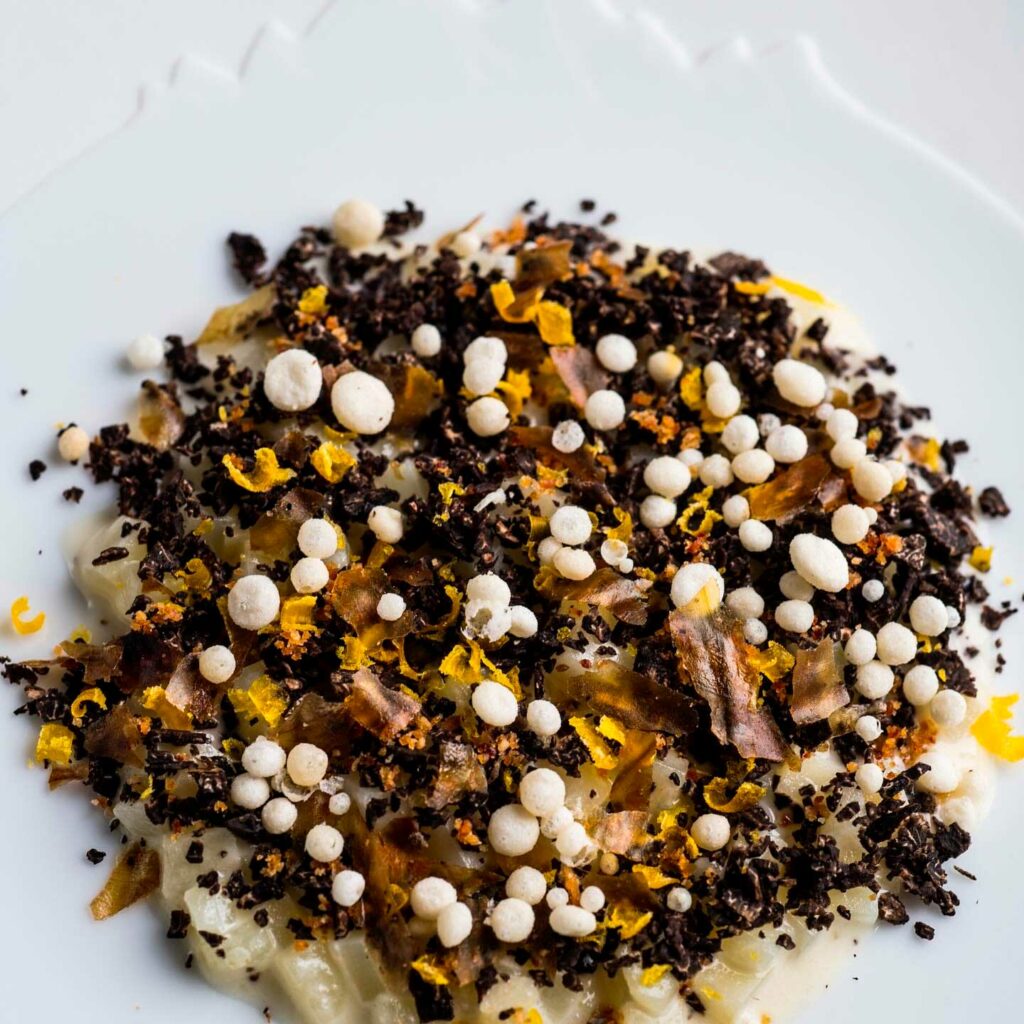
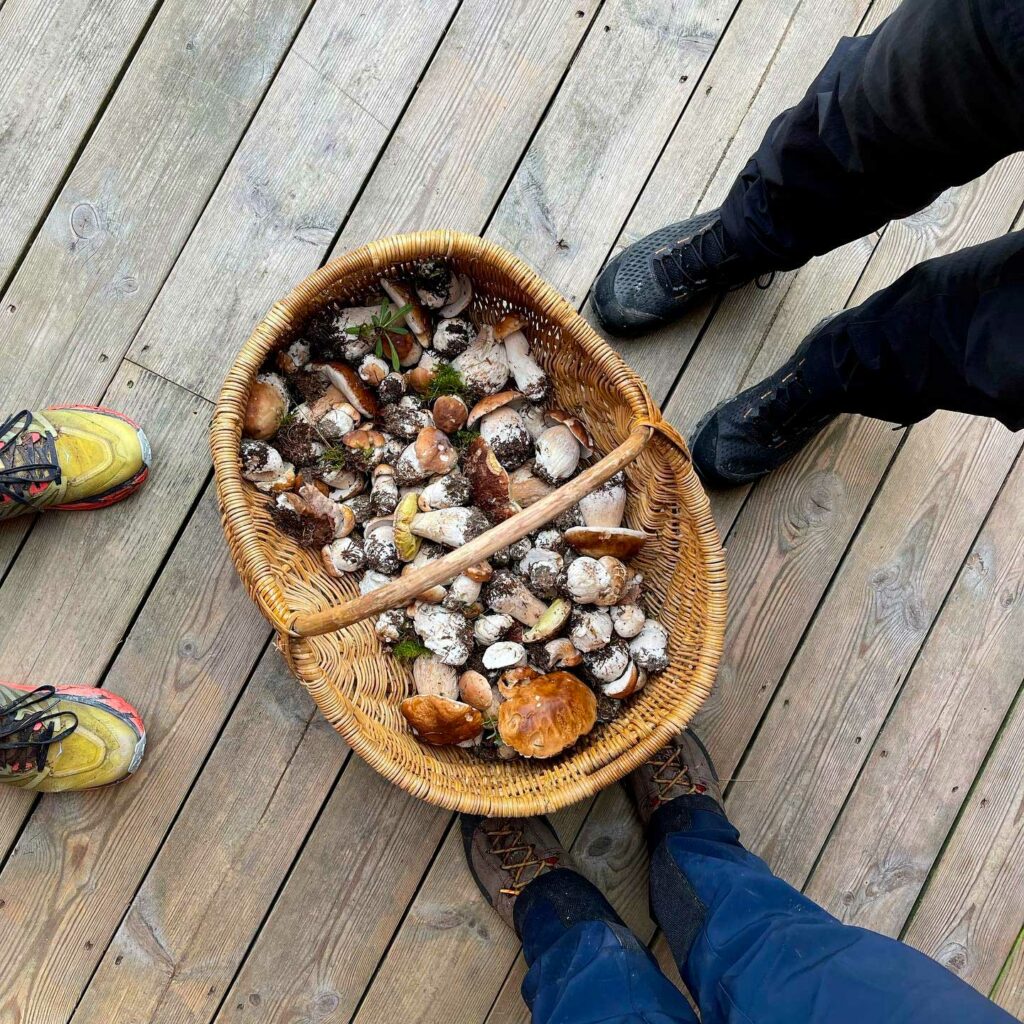
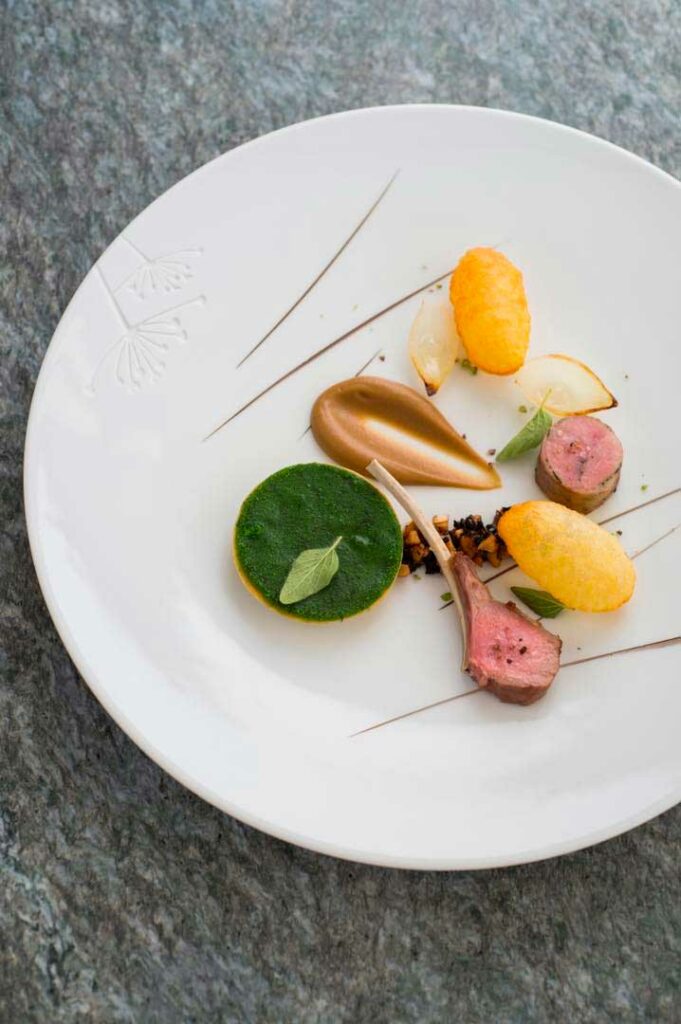
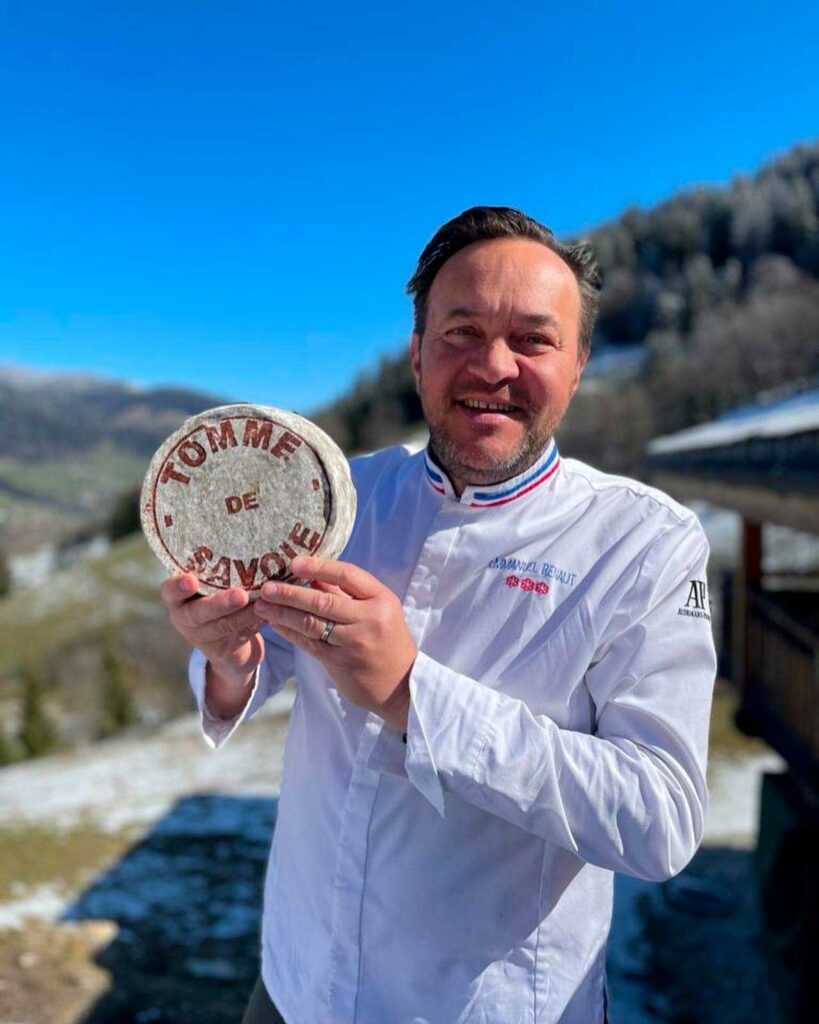
The dining experience
Service at Flocons de Sel is polished yet heartfelt. Guests often note the absence of formality’s coldness—staff convey warmth, knowledge, and engagement with local narratives. The pace is meditative: courses arrive in harmony with mountain light, and moments of pause are expected, letting the setting complement the tasting.
Expect a tasting menu experience that spans two and a half hours or more. The price point is in line with three-star gastronomy. The restaurant serves dinner in evenings; due to the relocation, seasonal service is concentrated to certain months (notably summer through October at the village spot). Guests may also enjoy paired wine options, herbal infusions, and courses that emphasize the signature dishes of alpine terroir.
Many diners recount that Renaut himself appears to greet tables, reinforcing the personal connection between guest and chef. The setting—whether mountain slope or village street—becomes part of the meal’s narrative, a physical extension of his culinary identity.
Awards, sustainability, and other highlights
Flocons de Sel is celebrated not just for its culinary excellence but also for its environmental integrity. The property holds Relais & Châteaux membership, which entails standards of hospitality, ecology, and cultural preservation. The chef’s commitment to biodiversity, closed supply chains, minimal waste, and foraging is a consistent thread in his public discourse. The hotel includes eco-minded practices, using natural materials, energy-conscious design, and integration with the mountain environment.
In its review history, critics stress how nothing is incidental: portions, textures, aromatic detail—all are deliberate, revealing a deep respect for local produce and alpine identity. The relocation to Flocons Village underscores flexibility and resilience in maintaining the brand through renovation, showing a willingness to adapt without diluting identity. Press coverage often lauds the way Renaut transmutes mountain motifs into modern gastronomy, positioning him as a leading voice in alpine cuisine.
While Flocons de Sel has not expanded into multiple starred venues, its influence resonates: many chefs cite Renaut as a pioneer in bringing mountain cuisine to haute gastronomy. His public advocacy for preserving mountain food heritage secures his role as a cultural as well as culinary asset.
Alpine legacy reimagined
Flocons de Sel under Emmanuel Renaut offers more than a meal—it presents a vision of mountain cuisine as alive, evolving, and deeply rooted. It shows that fine dining need not be removed from nature; instead, it can reflect a living landscape, seasonal rhythms, and place-based dialogue. Renaut’s cuisine stands out not for brio, but for integrity—each plate feels like a conversation with the woods, the pastures, the lake, the herb garden.
For travelers to the Alps who seek gastronomic excellence intertwined with terroir, Flocons de Sel remains a must. It invites you to taste not just technique, but the soul of the mountain. In that sense, Emmanuel Renaut has not built a restaurant—he has opened a window onto his world.
Cook in France is your independant source for food in France.